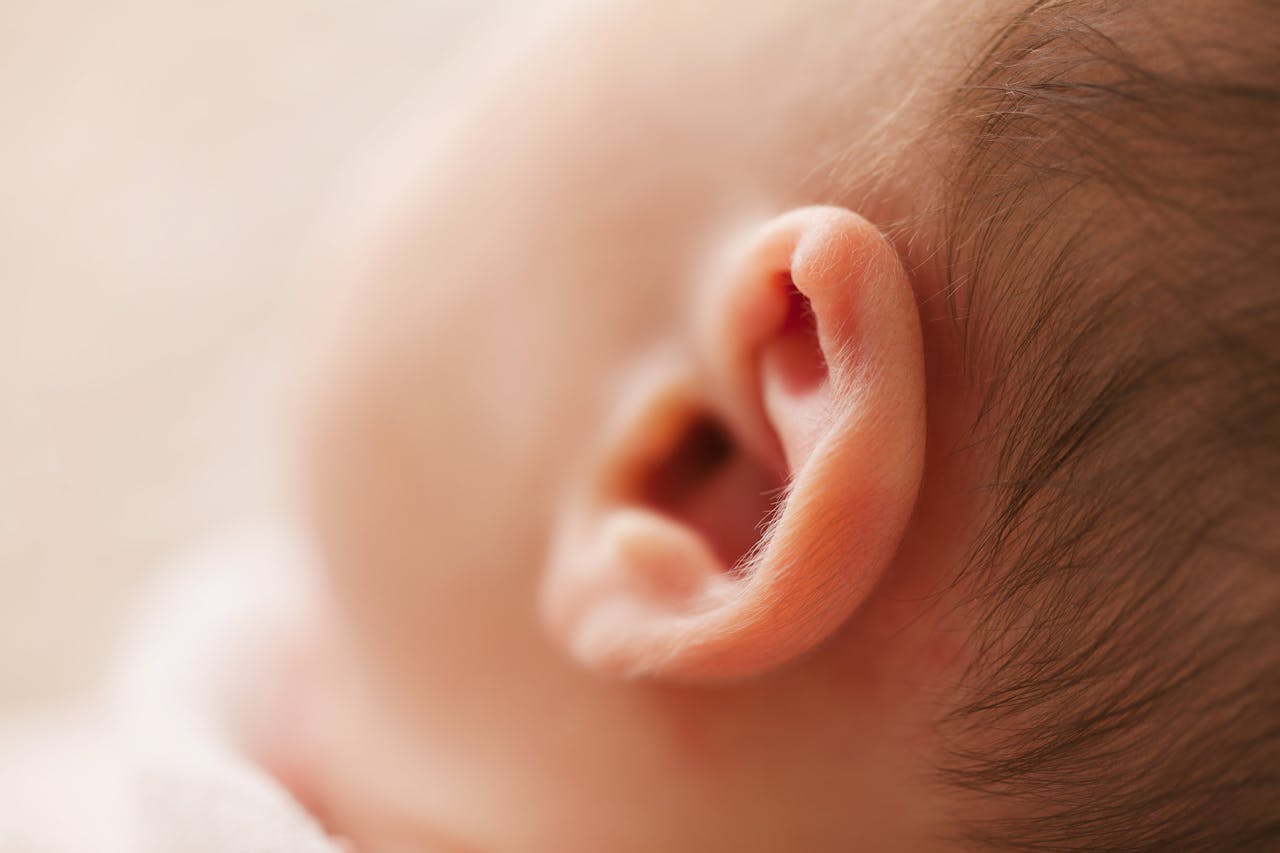Ear infections are one of the most common health concerns in young children. If you’re a parent who’s had to comfort a crying baby at 2 a.m., wondering if it’s just teething or something more serious, you’re not alone. Pediatricians see ear infections frequently, especially in children under the age of five. While most ear infections are treatable and resolve quickly, they can also be painful, distressing, and, if untreated, lead to complications like hearing difficulties or delayed speech development.
This guide offers a clear and compassionate look at ear infections in children—what causes them, how to recognize the signs, what treatment options are available, and when to seek help from a pediatrician.
Why Are Ear Infections So Common in Young Children?
The anatomy of a child’s ear plays a big role in their vulnerability to infections. The Eustachian tubes—small passageways that connect the middle ear to the back of the throat—are shorter, narrower, and more horizontal in children than in adults. This structure makes it easier for viruses and bacteria to travel to the middle ear and become trapped, especially during or after a cold.
In many cases, an ear infection follows a respiratory infection. As congestion builds up, it can cause fluid to accumulate behind the eardrum. If that fluid becomes infected, an ear infection develops. Children in daycare, those who use pacifiers, or those exposed to tobacco smoke are also at higher risk.
Signs and Symptoms to Watch For
Young children may not always be able to tell you that their ear hurts, but their behavior can speak volumes. Here are some common signs of an ear infection:
-
Tugging or pulling at the ear
-
Irritability or frequent crying
-
Trouble sleeping, especially when lying down
-
Fluid draining from the ear
-
Difficulty hearing or responding to sounds
-
Balance problems or clumsiness
-
Fever (typically 100°F or higher)
Not every symptom needs to be present. In some cases, children may simply appear more fussy or lethargic than usual. If your child has recently had a cold or upper respiratory infection and now seems off, it’s worth reaching out to your pediatrician.

The Pediatrician’s Role in Diagnosing and Treating Ear Infections
When you bring your child to the pediatrician with concerns about ear pain, the first step is a careful examination. Using an otoscope, the pediatrician checks the eardrum for redness, swelling, or fluid behind it. This visual assessment is essential in determining whether your child has an ear infection and, if so, how severe it is.
Depending on your child’s age, symptoms, and overall health, the treatment plan may vary:
-
Mild cases in older children may be monitored without antibiotics for 48–72 hours to see if symptoms improve naturally.
-
Younger children or those with more severe symptoms may need antibiotic treatment right away.
-
Pain relief options, such as acetaminophen or ibuprofen, may be recommended to reduce discomfort and fever.
A pediatrician considers the full picture before suggesting a course of action. The goal isn’t just symptom relief—it’s protecting your child’s long-term hearing and development.
Do All Ear Infections Require Antibiotics?
Not necessarily. Many ear infections—especially those caused by viruses—can clear up on their own. Overprescribing antibiotics can lead to resistance, so pediatricians follow evidence-based guidelines to decide when medication is appropriate.
For children over the age of two with mild symptoms, it’s often safe to adopt a watchful waiting approach for a few days. If symptoms don’t improve—or worsen—then antibiotics may be prescribed. On the other hand, babies under six months or children with high fever and significant pain usually benefit from early treatment.
Always follow your pediatrician’s instructions closely, especially when antibiotics are prescribed. Even if your child starts feeling better after a couple of days, it’s important to complete the full course of medication.
What If My Child Keeps Getting Ear Infections?
Some children experience recurrent ear infections, defined as:
-
Three or more infections in six months
-
Four or more in one year
Repeated infections can disrupt sleep, affect hearing, and impact speech development. If this is the case for your child, your pediatrician will look at contributing factors like allergies, exposure to smoke, or structural issues in the ear.
In some situations, a referral to an ear, nose, and throat (ENT) specialist may be recommended. ENT specialists can evaluate the need for ear tubes—tiny cylinders inserted into the eardrum to help drain fluid and equalize pressure. This is a common outpatient procedure that often reduces the frequency of infections and improves hearing.
Hearing and Speech Development: What You Should Know
Persistent ear infections or fluid buildup behind the eardrum can affect how well your child hears. Since children learn to speak by listening to sounds around them, untreated hearing issues can delay speech and language milestones.
If your child:
-
Doesn’t respond to their name
-
Speaks less than peers
-
Has unclear speech
-
Seems inattentive or frustrated during conversations
… then it may be time for a hearing test or a speech and language evaluation.
Pediatricians monitor developmental milestones closely and may refer your child to a hearing specialist or speech therapist if there are concerns. Early detection leads to better outcomes, and the sooner we intervene, the easier it is to support your child’s growth.
Emotional and Behavioral Impacts
Painful or recurrent ear infections can also affect your child’s behavior. Poor sleep, discomfort, and difficulty hearing can all contribute to mood changes, clinginess, or frustration. As pediatricians, we often work with parents to address both the physical symptoms and the emotional toll infections may take.
Children going through transitions—such as welcoming a new sibling—may struggle even more when dealing with an illness. If your family is adjusting to a big change at home, you might find our article Easing the Transition: A Pediatrician’s Guide to Helping Your Child Adjust to a New Sibling helpful. A stable routine and emotional support can make a big difference during periods of illness.
If your child’s behavior changes during or after an illness—more tantrums, clinginess, or regression—it could be a response to discomfort. In these situations, using gentle discipline strategies can be more effective than punishment. A pediatrician can help you identify if the behavior is medically driven or part of a larger emotional response.
Can Ear Infections Be Prevented?
While not every ear infection is preventable, there are steps you can take to reduce the risk:
1. Stay Up to Date with Vaccinations
Vaccines like the pneumococcal and flu vaccines protect against common bacteria and viruses that can lead to ear infections.
2. Avoid Secondhand Smoke
Exposure to smoke increases the risk of respiratory infections and ear problems.
3. Practice Good Hand Hygiene
Teach your child to wash their hands regularly. Limiting exposure to germs—especially in shared spaces like daycare—can lower infection risk.
4. Feed in an Upright Position
If your child is bottle-fed, hold them in an upright position during feeding. This reduces the risk of milk entering the Eustachian tubes.
5. Encourage Breastfeeding
Breastfeeding for at least the first 6–12 months can help boost immunity and protect against infections.
6. Manage Allergies
Allergies can cause nasal congestion and Eustachian tube dysfunction. Talk to your pediatrician about allergy testing or treatment if symptoms are frequent.
What About Natural Remedies?
Warm compresses placed gently over the ear can soothe mild pain, and saline nasal sprays may help with congestion. But avoid inserting anything into your child’s ear unless instructed by a healthcare provider.
Some over-the-counter ear drops can be harmful if the eardrum is perforated, which is why a proper diagnosis is essential before trying home remedies.
Always consult your pediatrician before using any non-prescription treatments. What works for one child may not be safe or appropriate for another.
When Should I Call the Pediatrician?
Call your pediatrician if:
-
Your child has a fever over 100.4°F
-
Ear pain lasts more than a day
-
There’s fluid or pus draining from the ear
-
Hearing seems affected
-
Your child is unusually sleepy, irritable, or unsteady
It’s better to get checked and be reassured than wait too long and risk complications. Pediatricians are trained to diagnose ear infections accurately and offer relief that’s safe for your child’s age and medical history.
Building Trust with Your Pediatrician

You know your child best. When something feels off, your observations are incredibly valuable. At Gentle Pediatrics, we see every parent as a partner in their child’s care. We listen, we explain, and we work together to make the best decisions—whether that means monitoring symptoms at home or beginning treatment right away.
Having a pediatrician who understands your child’s health history and developmental stage can make all the difference when managing recurring or painful issues like ear infections. It’s not just about medicine—it’s about peace of mind, continuity of care, and knowing someone is always there to guide you.
Helping Your Child Hear, Heal, and Thrive
Ear infections are a common part of childhood, but they don’t have to be a source of anxiety. Understanding the causes, signs, and treatments empowers you to act with confidence. With the support of a pediatrician, your child can recover quickly and avoid long-term complications.
If your child is showing signs of an ear infection—or if you’ve been dealing with them frequently—schedule a visit today. Timely care can ease your child’s discomfort and keep them on track with learning, growth, and development.
Your child deserves care that’s thoughtful, gentle, and tailored to their needs. That’s what we’re here for.
